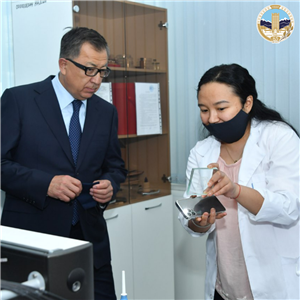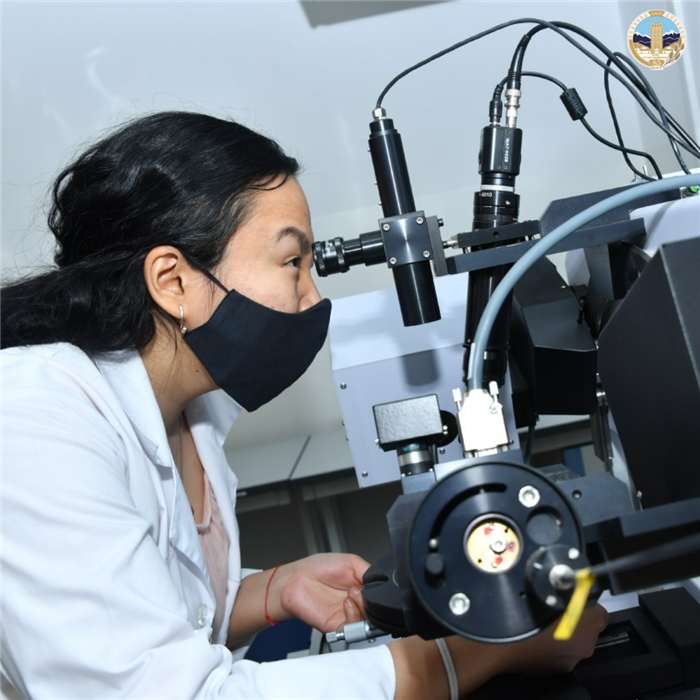- Main page
- News
MARKIZAT MYRZABEKOVA, YOUNG SCIENTIST: CHEAP PRICE, LIGHT - LIGHT MOBILE PHONE BATTERIES ARE EFFECTIVE FOR CONSUMERS
5/11/2021
During the 30 years of independence, the First President of Kazakhstan, President Nursultan Nazarbayev, paid special attention to the comprehensive education of young people and their formation as modern professionals. During one of the regular meetings with young people, he said, “The first successful projects have started to appear in the leading universities of the country. This experience needs to be expanded, ”he said.
In his address to the nation "Kazakhstan in the new situation: the period of action", President Kassym-Zhomart Tokayev spoke about the development of science. , emphasizes the importance of funding and supporting science.
Al-Farabi Kazakh National University currently employs about 300 young scientists under the age of 40. KazNU has started to fully present the scientific discoveries and developments of young researchers studying and working. Our first heroine is Markizat Myrzabekova, PhD student at the Faculty of Physics and Technology, specialty "Materials Science and Technology of New Materials".

- As a child I wanted to be a doctor. However, I loved math at school. If you know mathematics, you are interested in physics, as well as chemistry. I often heard among students that "physics is difficult, girls can not master it." This word, on the contrary, motivated me to choose the field of physics. However, when I entered the Al-Farabi Kazakh National University, I did not immediately notice that the doors to science were wide open. Only in 2012, when I was a sophomore, did I get a job at the Open National Laboratory of Nanotechnology (OPTL) and became interested in discovering new materials, nanotechnologies and exploring new properties. Soon after participating in the Farabi World Student Conference, my project "On the creation of humidity sensors" was recognized as the best innovative project among students. This device is designed to measure humidity and ensure the safety of equipment for proper storage of food and grain in the room.
In 2014, I graduated from the Faculty of Physics and Technology of KazNU and received a bachelor's degree in engineering and technology. And in 2016 I received a master's degree in this field. During my master's degree, thanks to various programs of KazNU, I visited laboratories in Warsaw, Prague and Milan. The field of nanotechnology is well developed in Europe, America and Japan. So I wanted to go to these countries and see how this industry is being developed abroad. My dream was fulfilled by the Open National Laboratory of Nanotechnology.
As a young specialist, my workplace often sent me to conferences and exchanges. Igor Shvets, a foreign professor who once met at an international conference, asked, "Why don't you come to study with us?" He asked. "I don't have the money now. I can't go to Ireland. I come from a simple family, ”I said openly. He introduced the Erasmus + program. If you get acquainted with the rules of admission, you can test yourself as a student or as a student. As I was not a student, I took a risk as an intern. As a result, I learned to work with many types of microscopes, such as scanning electron microscopes, X-ray photoelectron spectroscopy, tunneling microscopes, and transmission electron microscopes.
Patented invention
- A few years ago, a Samsung mobile phone exploded. It was caused by a rechargeable battery. At that time, "why not make it an environmentally friendly battery ?!" I thought. This question bothered me even when I was abroad. Thinking about it, I began to study this topic. I studied the work of foreign scientists in this field and weighed what we can do. Abroad, scientists are funded by Intel and Facebook. These companies tell researchers their problems, and scientists work to solve them. The second way is to come up with a ready-made patented idea, win money for its discovery and put it into production. I chose this second way. I patented my project (author's certificate №107731), now I want to work on its further implementation.
The theme of my project: "Creation of supercapacitors that increase reliability based on domestic nanocomposites of graphene and manganese dioxide." When graphene (a type of carbon) is added to manganese dioxide, a bond is formed and a current is formed. Using this current, I realized that it is possible to make a supercapacitor, ie a device that stores electricity.
Most lithium batteries in our phones. There is a risk of explosion and it also affects the weight of the mobile phone. In addition, the price of the phone is not cheap, and if you damage it, it will cost a lot to rebuild it. If we use a lightweight battery instead, it will lose weight and will not cause much environmental damage. I compared it with batteries made abroad. They use ruthenium oxide. Due to the small reserves of ruthenium in the world, it is very expensive for producers. And the country has enough reserves of graphene and manganese in my project. Moreover, the synthesis process is simple. That is why it is much more effective to implement my project. In all the other batteries I've seen, the synthesis process is very complicated. There are no such synthesizers in the country, so I decided to choose two raw materials that are more efficient in terms of minerals.
The issue of energy conservation is very relevant today. Mobile phones, electric cars, laptops, unmanned aerial vehicles need light, large and energy-saving devices. Even now, cars like Mercedes and Lexus don't look as great as electric Tesla. This is due to the fact that scientists prioritize technologies that minimize environmental damage. From this point of view, my cell phone batteries are cheap, lightweight and long lasting.
I want to make a Power Bank
- To make this battery, which I invented, you first need to buy raw materials. Then there should be a clean place to work. As the raw material undergoes special chemical treatment, employees must wear special uniforms. I think I need to make a new cell phone before I can put my batteries into production. This is because the battery is small. If we put it in the Power Bank battery, it can be replaced. To be included in a mobile phone, you must also receive an offer from the phone manufacturer. It will also take some time to sign the contract. So for now, I want to start producing Power Bank, a portable charger. We can also increase its sales by using marketing tools, and Power Bank is a domestic product made in Kazakhstan. I would say that every product we make is an action for the development of our country. If we come up with something new, it will create new jobs, allow people to get jobs, and increase the number of people who choose physics.
For me, nanotechnology is a new and infinite world. Because the nanoworld is not subject to the classical laws of physics. What we are studying is a small world, atoms and nuclei. If you are a nanotechnologist, you can learn the properties of materials and have a deep understanding of technology. As Kazakhstan is a developing country, we can not say that the field of nanotechnology is highly developed. However, nanotechnology laboratories exist in several cities. Looking at those laboratories, we can see that we are moving forward. In this regard, I would like to thank my teachers for inspiring and guiding me in the path of science.
Press service of Al-Farabi Kazakh National University

